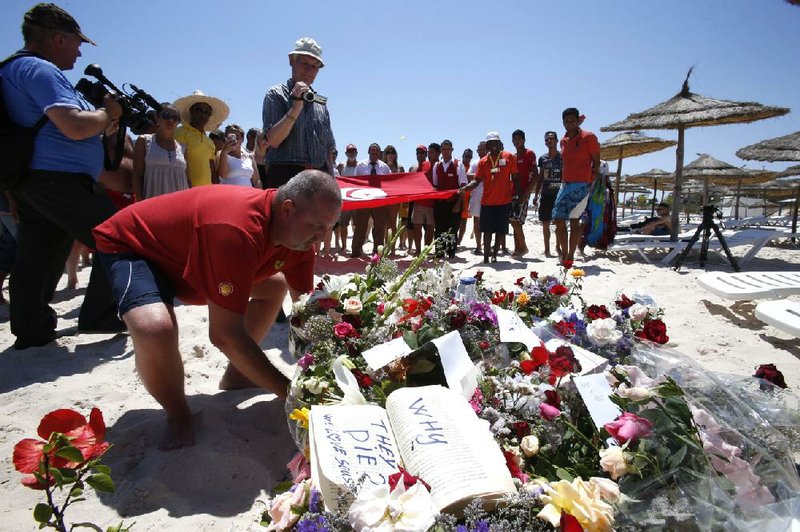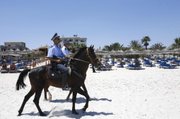SOUSSE, Tunisia -- The student who massacred vacationers on a Tunisian beach and at a swank resort hotel acted alone during the attack but had accomplices who supported him beforehand, an Interior Ministry official said Sunday.
Police were searching nationwide for more suspects after the killing of at least 38 people in Sousse on Friday, in Tunisia's deadliest ever such attack. The attacker's father and three roommates were detained and being questioned in the capital, Tunis, said Interior Ministry spokesman Mohamed Ali Aroui.
The attacker has been identified as Seifeddine Rezgui, a 24-year-old graduate of Tunisia's Kairouan University, where he had been living with the other students. The attack was claimed by the radical Islamic State group.
"We are sure that others helped but did not participate," Aroui said. "They participated indirectly."
Investigators believe the accomplices provided the Kalashnikov assault rifle to Rezgui and helped him get to the scene, Aroui said.
Ballistic tests showed the bullets came from a single Kalashnikov, Aroui said, adding that the attacker was equipped with four ammunition chargers -- all found by investigators. Aroui said each might hold 30 rounds.
Shortly after Friday's shooting rampage, Aroui had initially said two people were involved in the attack. To some, the long duration of the assault -- reportedly lasting nearly 30 minutes -- and the high casualty count might indicate that more than one gunman was involved.
The attacker methodically moved from the beach to the hotel's swimming pool, reception and other areas. The death toll surpassed the 22 people killed in March at The National Bardo Museum outside Tunis -- again mostly tourists, in a country known for its beaches and rich history.
Authorities have yet to suggest a motive for the carnage. A security official close to the investigation said the student frequented an "unofficial" mosque in the Tunisian holy city of Kairouan for the past two years.
The official said a swimmer had found the attacker's cellphone in the Mediterranean. The phone showed the attacker spoke with his father just before his assault, the official said on condition of anonymity because he wasn't authorized to speak publicly.
Friday's attack on the Imperial Marhaba Hotel shook the North African nation, which thrives on tourism and has struggled, since its 2011 revolution, to be the one Arab Spring country that succeeds in transitioning from authoritarianism to democracy.
The bloodshed shocked European nations across the Mediterranean worried for the safety of their citizens in Tunisia -- and about what it may mean for their own countries in an age of globalized terrorism.
British counterterrorism police official Mark Rowley said Sunday that Britain has mobilized more than 600 officers and staff -- one of the force's largest counterterrorism deployments in recent years -- in response to the attack.
Britain has deployed senior detectives and forensic teams to Tunisia.
At least 15 Britons were among the 38 killed, the most serious attack on the British since 52 people were killed in attacks targeting London's transport network in July 2005. Three Irish nationals were also among the dead.
Britain's Foreign Secretary Philip Hammond said it was highly likely that "a significant number" of the victims yet to be identified would be British.
British Prime Minister David Cameron is scheduled to address Parliament today on the attack.
While the U.K. is set to debate new anti-terrorism legislation, Home Secretary Theresa May said proposals won't be rushed, setting her at odds with Labor lawmaker Alan Johnson, who said work should be done "very quickly." Previous attempts to give security services more access faced opposition from those wanting to safeguard personal information.
"This is about some powers that are very significant," May said in an interview Sunday with the BBC's Andrew Marr. "We want to make sure that we are going to get the regulatory framework right for the future."
The nature of attacks and the challenges facing security services are changing, she said.
Johnson, a former Home Secretary, said Friday's attacks showed the need for the communications data bill.
"We have to give the security services the tools to do the job," he said in a separate interview with Marr. "We have to move ahead and press on with that as quickly as possible."
In July 2014, the government pushed emergency legislation through Parliament to ensure companies keep email, text and phone-call data for a year to help law enforcement agencies. A broader attempt by May to allow security services to access records of website visits and social-media messaging was abandoned in 2013 following concern that it would infringe on civil liberties.
In Tunisia, authorities moved quickly to bolster security for tourists and other vacationers. Interior Minister Mohamed Najem Gharsalli announced late Saturday the deployment of 1,000 extra police officers at tourist sites and beaches. Tunisia's tourism sector made up nearly 15 percent of the country's gross domestic product in 2014.
"We don't want to make tourist establishments into barracks. That's not our goal. But we must act to guarantee the security of the tourist sector," he said.
It wasn't clear whether the reinforcements would all be in uniform. There is currently a tourism police unit in vacation areas of Tunisia and numerous police in civilian clothes.
Tourism Minister Selma Elloumi will meet with foreign ambassadors to lay out new security measures for tourists.
On the night of the attack, Prime Minister Habib Essid announced a series of measures, including closing 80 mosques not condoned by the state.
The owner of the Imperial Marhaba Hotel, Zohra Driss, said unarmed beach guards "tried to beat [the attacker] with chairs, with flower vases of flowers, but it was impossible."
The hotel's beach security chief Lotfi Torkhani said on Sunday that two armed security officers, one at the main entrance and one at the beach, would be provided by the state on Wednesday.
"Many of my English friends died. They have been visiting us for 10 years. They even visited me at home and ate Tunisian food," Torkhani said. He echoed numerous accounts from tourists and hotel employees of the bond between them. "They love me and I love them."
Kuwait Bomber ID'd
In Kuwait, officials said Sunday that the suicide bomber who killed at least 27 worshipers at a Shiite Muslim mosque Friday had been identified as a young Saudi national who arrived in the Persian Gulf emirate only hours before the attack.
The bomber was identified by Kuwait's Interior Ministry as Fahad Suleiman Abdulmohsen Al-Gabbaa, born in 1992. Authorities said he flew into Kuwait's international airport at dawn on the day of the noontime attack at one of the emirate's oldest Shiite mosques.
In addition to those killed, more than 250 were wounded, with the interior of the Imam Sadiq mosque left strewn with bloody debris and broken bodies. The attack's symbolic significance was magnified by taking place during the holy month of Ramadan and at Friday noon prayers, the most important of the Muslim week.
Kuwaiti authorities also said Sunday that they had detained the driver of the vehicle that brought the attacker to the mosque. He was identified as a member of the country's large stateless population known as bidoon.
The Interior Ministry said it was still investigating the plot surrounding the bombing, but described an alleged accomplice arrested earlier as involved with a "deviant ideology"-- a term generally used to characterize Islamist militancy. A government-linked newspaper said seven suspects were in custody.
The bombing was claimed by an affiliate of the Islamic State calling itself Najd Province, a historic reference to the region surrounding the Saudi capital of Riyadh. Offshoots of the group generally assign themselves names affiliated with their geographic base.
The Sunni extremists of Islamic State consider Shiites to be heretics and have repeatedly called on followers to target them. Similar attacks have taken place at mosques in Saudi Arabia and in Yemen, where a Saudi-led Sunni military coalition has carried out more than three months of bombing targeting Shiite Muslim rebels known as Houthis.
Information for this article was contributed by Elaine Ganley, Andrea Rosa and Bouazza Ben Bouazza of The Associated Press; by Emma Charlton of Bloomberg News; and by Laura King and Amro Hassan of the Los Angeles Times.
A Section on 06/29/2015

